READER COMMENTS ON
"Thanks to Wisconsin's Scott Walker for Helping to Put Talk Radio on Trial at the FCC"
(32 Responses so far...)
COMMENT #1 [Permalink]
...
Amy Sturdevant
said on 5/29/2012 @ 1:05 pm PT...
I also remember a time when a person could state an opinion and not be called names and ridiculed. However you as a news personality did exactly that to me. You should not throw stones when you are very aggressive about your comments. I would not classify the way you spoke to me as friendly, persuasive, informative or even in a manner where you tried to argue your point in an educated informed manner!
COMMENT #2 [Permalink]
...
Sue Wilson
said on 5/29/2012 @ 2:01 pm PT...
Excuse me, Amy, I am confused, when have I EVER ridiculed you? I don't think we know each other at all. I prefer to engage in a friendly way and allow people to reveal themselves, thank you very much.
The real issue here is whether radio hosts, who routinely ridicule anyone left of Ronald Reagan, have the sole rights to the microphones they speak into. Radio is a scarce commodity, there are only a few frequencies in every community, and it belongs to ALL the people, not just the right wing. Internet belongs to us all too, but it is not scarce, so it isn't regulated the same way (nor should it be.)
COMMENT #3 [Permalink]
...
chong lee
said on 5/29/2012 @ 3:13 pm PT...
Free market is a hellava thing isent it? If people don't to hear it they can turn off the dial or switch to different channel.
It just happens nobody wants to listen to Liberal BS on the radio. If they did they be more successful.
Remember Fox News started as small little nothing that had to fight to get on the air.
COMMENT #4 [Permalink]
...
Ancient
said on 5/29/2012 @ 3:21 pm PT...
Great piece Sue. I hope people all over the country participate. I believe getting rid of the Fairness Doctrine was one of the worst decisions ever, and a very calculate move by those who think they can own us all. If the Zapple Doctrine is still on the books how can they ignore it? Thanks for raising this issue!
COMMENT #5 [Permalink]
...
Brad Friedman
said on 5/29/2012 @ 3:33 pm PT...
Chong Lee - Sorry to see that Fox "News" has so misinformed you that you actually think there is a "free market" in radio. There isn't. There is no competition and there is a corporate lock on the PUBLIC airwaves that rips you off as a consumer and as someone who has been conned --- over those same government-subsidized and publically-owned airwaves --- to believe otherwise.
Glad you've found us. Perhaps you'll finally become educate about the real free market versus the "free market".
COMMENT #6 [Permalink]
...
Steve Lane
said on 5/29/2012 @ 3:48 pm PT...
chong lee a rigged market is not a free market. It may be that one can switch off a program one choses not to hear but how do you listen to a program you might choose if it is denied the opportunity to broadcast?
COMMENT #7 [Permalink]
...
Ancient
said on 5/29/2012 @ 3:52 pm PT...
COMMENT #8 [Permalink]
...
Davey Crocket
said on 5/29/2012 @ 4:55 pm PT...
Well I am no expert on public airwaves but I know a little about human nature. If nobody listened to Rush (e.g.) and no advertisers made money from his show, he would be gone tomorrow.
I seem to recall that there was a major effort from the left to get Rush off the air by pressuring his advertisers. Why would they (the left) use market forces if there were no free market? Perhaps they are watching too much Fox news I guess.
I voted in the Texas primary today...yep, you guessed it...the Republican primary. It was a huge turnout...could not believe it.
eSlate voting machine. My vote has already been hacked I am sure.
COMMENT #9 [Permalink]
...
Sue Wilson
said on 5/29/2012 @ 5:09 pm PT...
Chong Lee,
Fox News is not on the air. Fox News is on Cable. Cable is private business; when you write your check to Comcast (or whoever) you make a deal to bring privately produced programming from Playboy to Disney into your home.
Broadcasting is a public / private partnership. The public owns the frequencies in the air, the broadcasters own a bunch of equipment and make a deal with We the People to use our frequencies - IF they serve the public interest. Ratings and money are not part of the bargain. If they are smart enough to serve the public and make a buck or ten or a million, good for them.
But not allowing broadcasters to be shills for the Republican party in the 60 days before an election does serve the public - the 70% of the public who do not register with the Republican Party.
Also - did you know that FOX News lost tens of millions of dollars the first five years it was on cable? Only Rupert Murdoch's deep pockets kept it alive.
COMMENT #10 [Permalink]
...
Sue Wilson
said on 5/29/2012 @ 5:19 pm PT...
Davey Crocket, is it morally right to allow corporations which completely control radio in Milwaukee, Wisconsin to use the airwaves we ALL own to promote one political party? It's not, and it's not legal either. This has nothing to do with ratings and money.
COMMENT #11 [Permalink]
...
Davey Crocket
said on 5/29/2012 @ 5:50 pm PT...
Sue #10
I don't think we can discuss this on moral grounds until we can agree on a common basis for morality.
As to legality...I suspect someone must take the issue to court and let the courts decide.
COMMENT #12 [Permalink]
...
Brad Friedman
said on 5/29/2012 @ 6:14 pm PT...
Davey Crocket @ 8 said:
Well I am no expert on public airwaves
Clearly... 
If nobody listened to Rush (e.g.) and no advertisers made money from his show, he would be gone tomorrow.
Actually, not so. There were several weeks (and still are) when ads were going completely unsold on Rush's show. He was/is kept on the air anyway. That may well change after the election is over, however. We'll see how long Premiere wants to lose money on him.
Remember, Clear Channel also owns Premiere (Rush's syndicator), so they have an interest in making sure Rush stays on the air so they can recoup some of the $40m they have promised to pay him each year. Had the syndicator not been owned by the same corporation that owns the stations, many more of them would likely have dumped Rush when he became a liability for the stations. But it's a rigged system without competition or free market, so that is unlikely to occur.
Look up US v. Paramount Studios to see how this nation felt about the owners of the cinemas also being the owners of the studios and holding a monopoly on what was therefore seen in the cinemas. Back when this nation was in favor of real free markets and against trusts and monopolies, we stopped it. Now, the system is rigged to screw you and, worse, the PUBLIC airwaves are the ones telling you there is a "free market" on the public airwaves.
Why would they (the left) use market forces if there were no free market?
Wow. What an embarrassing argument to make. So if there is a monopoly on, say, corn or cable TV and I decide I won't eat corn or won't use cable TV, that means there is no monopoly? You're *really* arguing that a "free market" exists because I still have the choice not to eat corn?
Think you may need to review the old Economics 101 text book. Or...
Perhaps they are watching too much Fox news I guess.
... Just stop watching Fox "News" and listening to the rigged, monopolistic, once-public airwaves.
COMMENT #13 [Permalink]
...
Davey Crocket
said on 5/29/2012 @ 6:41 pm PT...
Brad #12,
Rush has a program. That program has advertisers. Rush makes money, Clear Channel makes money, advertisers make money. As long as that does not change, Rush stays on the air. If advertisers go away, Rush goes away. It is very simple.
If you can get the following Rush has, you will get advertisers and the left will have their voice on AM Radio.
This the beauty of capitalism.
COMMENT #14 [Permalink]
...
Brad Friedman
said on 5/29/2012 @ 7:02 pm PT...
Davey Crockett @ 13
If you can get the following Rush has, you will get advertisers and the left will have their voice on AM Radio.
The left will have their voice on AM Radio"?! Really?? Where??
Yes, you really don't understand how the rigged radio scam works over our public airwaves. Let me make this non-political for you.
Let's say the Crockett Company owns the licenses to the only two water wells in town. You get to sell the water from both to the public --- if you want to --- but only one well is actually piped into everyone's home. To get water from the other one you have to have heard about it existing (it's not advertised), find the well (there are no maps to it) and bring your own bucket and fill it up and take it home if you can. Because of that, water from the first well can be sold at 5 times the price.
Which well do you suspect is more popular?
That's how talk radio works now in the U.S. If the same companies own all the wells, there is no competition.
COMMENT #15 [Permalink]
...
Davey Crocket
said on 5/29/2012 @ 7:45 pm PT...
Brad #14,
OK, I concede. You win. The water well argument is indisputable.
COMMENT #16 [Permalink]
...
molly
said on 5/30/2012 @ 6:32 am PT...
Sue Wilson,
Thank you for working to bring back democracy in the US in the form of fair media.
"Also - did you know that FOX News lost tens of millions of dollars the first five years it was on cable? Only Rupert Murdoch's deep pockets kept it alive."
I have long suspected that Fox News' high viewer ratings are fabricated. I think time will tell that businesses are paid to keep fox news on their tvs for customers.
I read the Guardian online and am amazed at the information that is not covered in the US but the people in Great Britain seem to be interested in as well as knowledgable. (sp?)
Thank you again for your time and attention to this important matter.
COMMENT #17 [Permalink]
...
Nunyabiz
said on 5/30/2012 @ 7:22 am PT...
Problem is the SCOTUS will rule 99.99% of the time will rule for Reich wing nonsense.
If it helps democrats in anyway the SCOTUS will rule against it, period.
Scotus is worthless garbage for the next 30 years
COMMENT #18 [Permalink]
...
Robert
said on 5/30/2012 @ 7:52 am PT...
Brad, the argument of cable is not "airwaves" is not true. Cable is broadcast (up linked) to a private/government sponsored satellite, using OUR wavelengths, and down linked to our receivers, again using public airwaves. Has anyone ever tried to apply for a radio license, lately? Even non-profit low power tv and/or radio licenses are so difficult to get, they use a lottery system to review the applications. If you are not a large company, there is little chance of getting a license. I was involved in a community radio application about 30 years ago, and it was not easy then. The large corporations have made it almost impossible for a smaller group of individuals to get a license. Fairness is not as important as TRUTH IN BROADCASTING. If we have truth, fairness will follow.
COMMENT #19 [Permalink]
...
Chris Hooten
said on 5/30/2012 @ 9:26 am PT...
Dude, are you serious, Robert? You clearly do not understand what broadcast tv means.
COMMENT #20 [Permalink]
...
Ernest A. Canning
said on 5/30/2012 @ 10:53 am PT...
NUNYABIZ @18 Wrote:
Scotus is worthless garbage for the next 30 years.
Well, it will be if Mitt "Gordon Gekko" Romney is elected and permitted to Bork the Court.
BTW: Who the Hell is Amy Sturdevant?
COMMENT #21 [Permalink]
...
karlof1
said on 5/30/2012 @ 10:54 am PT...
Sue Wilson, thank you for reporting this and lodging the FCC complaint. It would be helpful if other progressive sites republished your piece. Have you submitted it eslewhere? And yes, I signed the petition.
COMMENT #22 [Permalink]
...
Irwin Mainway
said on 5/30/2012 @ 9:21 pm PT...
Re: "Remember Fox News started as small little nothing that had to fight to get on the air. "
That little nothing is headed by a career political operative Roger Ailes who is legally allowed to force his 'News' anchors to repeatedly LIE or be FIRED. They sued after refusing to LIE.
That little nothing was subsidized with $500 Million in deep pocket money before it earned one net dollar of profit.
Rush's radio ratings are shored up by conglomerates buying up competing proud progressive stations, dumping the shows, often to ZERO ratings following that.
This is big business, in case you haven't noticed commercial FM radio is DEAD. Radio hits from 1976 on 3 local stations??
Brad's topic: the FCC: Why the hell is a Republican among the two new members?
"The FCC's May public meeting, featuring the first votes by new commissioners Ajit Pai and Jessica Rosenworcel, was a noncontroversial one, with unanimous votes on three items.
Those were to: 1) Further explore the use of aerial-based communications technologies --- floating cell towers, as it were --- in times of emergency when terrestrial-based communications is compromised; 2) to approve the allocation of spectrum for medical monitoring technologies and 3) to free up some 800 MHz spectrum for wireless broadband by lifting channel-spacing limits and technical limitations.
Commissioner Robert McDowell welcomed his colleague, Republican Ajit Pai, with typical humor, pointing out that his name [is] the only one that could be spelled with a single Greek letter."
COMMENT #23 [Permalink]
...
Sue Wilson
said on 5/31/2012 @ 11:42 am PT...
Please don't worry about the new Republican on the FCC Commission. There are five commissioners; three from the President's party, two from the opposing party. There was one Democratic seat open, and one Republican. Both were Obama's picks.
COMMENT #24 [Permalink]
...
MarkH
said on 5/31/2012 @ 8:54 pm PT...
@22, I didn't know "Ajit" was a Greek letter. 
Funny how the MSM never tells us about anything Brad has found.
I've gotten away from almost all radio. When I'm at home I may listen to the local public radio station for some news or sports games and when I'm in the car I constantly scan until I get a song I want to hear. Aside from that I have recently gone digital to get away from compact discs and even now I'm listening to my choice of music played from an iPod through my stereo to regular speakers. It beats a CD changer or old-fashioned radio reception.
No need to worry about radio competition when you can avoid all that talk radio altogether. But, on the other hand, it's hard to get public discussion from talk radio when there's only the fascist Conservative Corporate Right hate view being expressed.
I'd like to see more people able to use Internet 'radio' stations on their smart phones or PCs, so the Left will be able to compete easily.
Let's use our technology and avoid being stuck in the past technology of broadcast radio or the past ideas of the Right.
COMMENT #25 [Permalink]
...
Larry Bergan
said on 6/1/2012 @ 1:19 am PT...
COMMENT #26 [Permalink]
...
Larry Bergan
said on 6/1/2012 @ 1:30 am PT...
Heck! Even if you're NOT stuck in your car, I think NPR and it's local affiliates are better now, then when Bush was in office.
I still can't stand it when they put Susan Page or others on to fill in for Diane Rehm, but It's still much better then 90% of what's on AM talk radio.
COMMENT #27 [Permalink]
...
Gus Wynn
said on 6/3/2012 @ 12:23 pm PT...
Some of the comments defending Rush Limbaugh and Fox News are really naive.
For one thing, Fox News did not lose tens of millions in each of their first five years, they lost hundreds of millions, some $450 million in total. Again, the reason they were able to last and become profitable was because Rupert Murdoch and News Corp had so much money laying around.
But it's never this simple. From it's earliest days, News Corp also had incredible help from Wall Street. In the "Black Monday" stock market crash of 1990, News Corp survived by getting extra-awesome sweetheart terms from banks who held off collecting about $7 billion in debt.
Murdoch, known for bartering free publicity for favors became an obvious shill for Wall Street, blurring the line between news and planted PR over the years.
Another myth is that liberal shows are not popular: if you want to call NPR's "All Things Considered" and "Morning Edition" liberal, it's had ratings comparable to Limbaugh and Hannity for years and years, blasting the "free market" argument to bits.
In fact, the problem with Air America may have been that they relied on corporate America for advertising while NPR is largely listener-supported. How can you expect corporate sponsors to line up if you are reporting on the corrupting influence of industry money in politics?
Former Air America host Rachel Maddow is a perfect example of this. Now the anchor of the MSNBC franchise, her show features paid commercials that promote everything from high-fructose corn syrup to hydrofracking. This proves that sponsors spend millions on liberal shows, every night.
Next we have Bain Capital. As part owner of Clear Channel, Limbaugh, Hannity and all the other big syndicated talk hosts, it's incomprehensible that we would stomach political talk that clearly favors Mitt Romney. But we do - things have gone so far, they even advertise their shows as the "Stop Obama Express".
Bain is a major shareholder in the media giant, but Morgan Stanley, Citigroup, Deutsche Bank, Credit Suisse and RBS are also investors, meaning it's in talk radio's interest to broadcast from the capitalist/corporatist point of view and shut down criticism during a crucial election period.
Ironically, Bain and it's partners even plundered Clear Channel, laying off hundreds of DJs and staff in October to boost short term interest payments to investors, while loading Clear Channel with unsustainable debt, making it a $20 billion dollar bankruptcy time bomb.
Hannity and Limbaugh don't seem to mind that their company just had it's assets raided, because they are parasites, paid for their political impact, not their profitability. Clear Channel's profit centers are big market music stations, while affiliates like Cumulus lose millions on the Rush Limbaugh Show.
Let's stop and think here. If you are the Waltons or Kochs, literally the richest people in the world, would you buy ads or buy stations? The programs we watch and hear are the result of decades of consolidation of pro-corporate programming, reducing competitiveness and diversity in the marketplace.
COMMENT #28 [Permalink]
...
GoinGreenie
said on 6/3/2012 @ 9:19 pm PT...
Sue isn't the first to discover these things at the FCC.
She speaks the truth as to "nothing working" When I went down this road, I came to the conclusion that nothing but removal of the FCC's/POTUS's/establishment agenda and handing it to the public is going to make the FCC go back to it's original mission statement. Let the people vote.
Currently, It works like this.
The big networks cow tow establishment agenda, in return they keep their frequency allocation.
That's what you are up against.
To lower this to a discussion about Kochs without equally lighting the flame under Soros is operating under the false left right paradigm delusion. They all suck, no exceptions.
Adding in CAFR money to the broadcaster's and we will never hear honest discussion about balancing budgets, because the only budget talked about are the public ones, not the hidden CAFR's. We will never hear honest discussion about banksters and the monetary system, it will be chaos, and the journalistic experts will all claim, "nobody could see it coming."
Instead of dealing with some obscure law, the focus (if you want to fix this problem) is going to have to be wrestling the controls away from the POTUS/FCC and letting the people VOTE!
Except.... Voting is screwed up, and getting worse.
This is a topic that should be front center, but theres too much other stuff to cover up with noise, all these wars, the fake cyberwar, the false flags, the fact that every person in washington DC is a god damn oath breaker--where's the US Constitution, or like fukushima and radioactive fallout, or logan act/bilderberg, or the agenda 21/depopulation/world bank and world government worm tied to the green movement. Or like the banksters for their monetary terrorism.
Oh well, the reset will be soon enough. At that time either we win, or we will be slaves.
Oh but hey, the man made carbon will kill us way before the radiation in the food chain, since there is no such thing as the SUN, or HAARP technology, or aerial spraying. It's all just conspiracy theory.
Also a note to sue. I have been attacked quite a bit on this blog. Not by you. But to deny attacks happen here on people who point inconvenient facts, is yet more delusion. I wish Brad would have stayed with the voting thing, instead of converting to a straight up ecofascist who STILL WONT ACKNOWLEDGE AGENDA 21!!
COMMENT #29 [Permalink]
...
Brad Friedman
said on 6/4/2012 @ 12:29 am PT...
GoinGreenie said @ 28:
I wish Brad would have stayed with the voting thing, instead of converting to a straight up ecofascist who STILL WONT ACKNOWLEDGE AGENDA 21!!
Happy to ACKNOWLEDGE AGENDA 21!! It's right here. And it's so verry verry skeeery!!!
So skeeery, in fact, that only the courageous RNC and the John Birchers working together can keep us safe from this dastardly threat to humanity!:
[I]n 2012 the Republican National Committee (RNC) drafted a resolution opposing Agenda 21, calling it "a comprehensive plan of extreme environmentalism, social engineering, and global political control." The language for this resolution, and others introduced in various state houses around the country, was drafted by the John Birch Society as a "model resolution" to oppose Agenda 21.
Stay safe! Don't let them enslave you!
COMMENT #30 [Permalink]
...
Brad Friedman
said on 6/4/2012 @ 12:30 am PT...
Gus Wynn @ 27 - Very smartly writ, sir!
COMMENT #31 [Permalink]
...
Sue Wilson
said on 6/4/2012 @ 1:39 pm PT...
This just in from Talker's Magazine: if it can be proved as alleged by Sue Wilson and the Media Action Center that these Milwaukee radio stations consistently only interviewed or promoted a single candidate without ever providing air time to his opponent, it is not only possible, but likely that the FCC would not apply the exception and would require equal time for the other candidates.
The FCC rules on this matter may have a significant effect on the upcoming Fall national and state elections.
http://www.talkers.com/2...waukee-newstalk-outlets/
COMMENT #32 [Permalink]
...
Burkey
said on 6/6/2012 @ 3:50 pm PT...
@Chong Lee
" did you know that FOX News lost tens of millions of dollars the first five years it was on cable? Only Rupert Murdoch's deep pockets kept it alive."
...See...that kind of puts the lie to the idea that programming succeeds or fails on its merit.
And that there's any sort of "free market" going on here.
But you don't have to believe a comment, look it up yourself. If you dare to ask yourself the question as to why money-losing programming would be propped up by a wealthy broadcaster year after year, ask yourself whether that broadcaster was using the medium for returns other than cash; ie, influence.
I mean, if you get that far, which you surely won't.
 Anyone remember a time when radio seemed friendly and informative, rather than hostile and manipulative?
Anyone remember a time when radio seemed friendly and informative, rather than hostile and manipulative?

 Trump Admin's Endless Waste, Fraud, Abuse on Voting, at DOJ, by DOGE: 'BradCast' 1/20/26
Trump Admin's Endless Waste, Fraud, Abuse on Voting, at DOJ, by DOGE: 'BradCast' 1/20/26 'Green News Report' 1/20/26
'Green News Report' 1/20/26
 Sunday 'Domestic Terrorist' Toons
Sunday 'Domestic Terrorist' Toons 'A Cornered Rat is a Dangerous Rat': Trump Terrorizes Minn., Menaces NATO, World: 'BradCast' 1/15/26
'A Cornered Rat is a Dangerous Rat': Trump Terrorizes Minn., Menaces NATO, World: 'BradCast' 1/15/26 'Green News Report' 1/15/26
'Green News Report' 1/15/26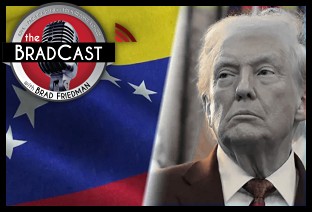 'This Isn't Close to Over': Mad King Trump in Venezuela (and Beyond): 'BradCast' 1/14
'This Isn't Close to Over': Mad King Trump in Venezuela (and Beyond): 'BradCast' 1/14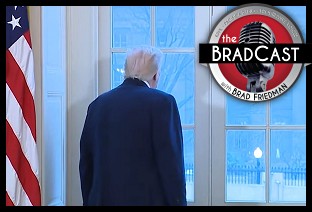 Things Getting Weirder as Trump Keeps Losing: 'BradCast' 1/13/26
Things Getting Weirder as Trump Keeps Losing: 'BradCast' 1/13/26 'Green News Report' 1/13/26
'Green News Report' 1/13/26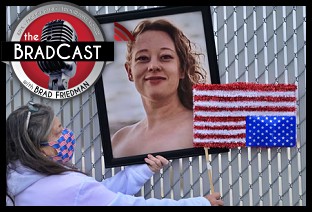 After ICE Murder in MN, Local Cops Disown Fed Policing Practices: 'BradCast' 1/12/26
After ICE Murder in MN, Local Cops Disown Fed Policing Practices: 'BradCast' 1/12/26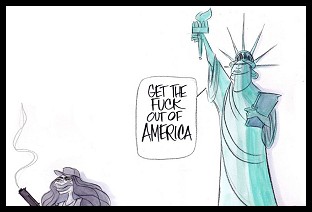 Sunday 'Ice Age' Toons
Sunday 'Ice Age' Toons 'Green News Report' 1/8/26
'Green News Report' 1/8/26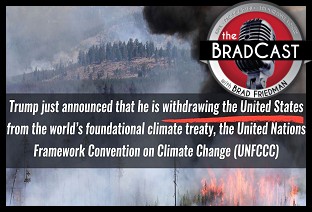 Trump to Congress, Climate, U.N., Rule of Law: DROP DEAD - 'BradCast' 1/8/26
Trump to Congress, Climate, U.N., Rule of Law: DROP DEAD - 'BradCast' 1/8/26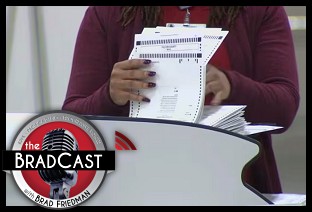 'Nonsense': Trumpers Claim 315k Fraudulent GA Votes in 2020: 'BradCast' 1/7/26
'Nonsense': Trumpers Claim 315k Fraudulent GA Votes in 2020: 'BradCast' 1/7/26 Jack Smith Testimony on Trump J6 Crimes, DOJ Weaponization: 'BradCast' 1/6/26
Jack Smith Testimony on Trump J6 Crimes, DOJ Weaponization: 'BradCast' 1/6/26 Trump War on Venez. is About Ego, Power, 'Alien Enemies Act': 'BradCast' 1/5/26
Trump War on Venez. is About Ego, Power, 'Alien Enemies Act': 'BradCast' 1/5/26 Have a Holly Jolly Somehow
Have a Holly Jolly Somehow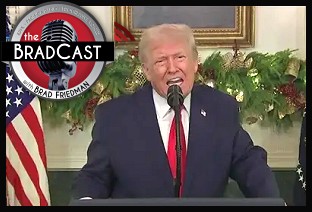 Old Man Shouts at People from WH for 20 Minutes: 'BradCast' 12/18/25
Old Man Shouts at People from WH for 20 Minutes: 'BradCast' 12/18/25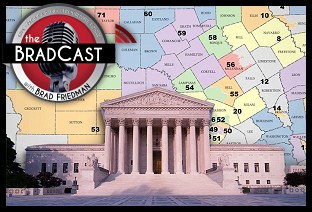 SCOTUS' How-To on Gerrymandering on 'Eve' of Election Year: BradCast' 12/17/25
SCOTUS' How-To on Gerrymandering on 'Eve' of Election Year: BradCast' 12/17/25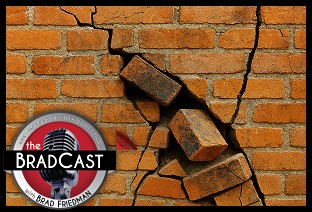 Bricks in the Wall: 'BradCast' 12/16/25
Bricks in the Wall: 'BradCast' 12/16/25
 VA GOP VOTER REG FRAUDSTER OFF HOOK
VA GOP VOTER REG FRAUDSTER OFF HOOK Criminal GOP Voter Registration Fraud Probe Expanding in VA
Criminal GOP Voter Registration Fraud Probe Expanding in VA DOJ PROBE SOUGHT AFTER VA ARREST
DOJ PROBE SOUGHT AFTER VA ARREST Arrest in VA: GOP Voter Reg Scandal Widens
Arrest in VA: GOP Voter Reg Scandal Widens ALL TOGETHER: ROVE, SPROUL, KOCHS, RNC
ALL TOGETHER: ROVE, SPROUL, KOCHS, RNC LATimes: RNC's 'Fired' Sproul Working for Repubs in 'as Many as 30 States'
LATimes: RNC's 'Fired' Sproul Working for Repubs in 'as Many as 30 States' 'Fired' Sproul Group 'Cloned', Still Working for Republicans in At Least 10 States
'Fired' Sproul Group 'Cloned', Still Working for Republicans in At Least 10 States FINALLY: FOX ON GOP REG FRAUD SCANDAL
FINALLY: FOX ON GOP REG FRAUD SCANDAL COLORADO FOLLOWS FLORIDA WITH GOP CRIMINAL INVESTIGATION
COLORADO FOLLOWS FLORIDA WITH GOP CRIMINAL INVESTIGATION CRIMINAL PROBE LAUNCHED INTO GOP VOTER REGISTRATION FRAUD SCANDAL IN FL
CRIMINAL PROBE LAUNCHED INTO GOP VOTER REGISTRATION FRAUD SCANDAL IN FL Brad Breaks PA Photo ID & GOP Registration Fraud Scandal News on Hartmann TV
Brad Breaks PA Photo ID & GOP Registration Fraud Scandal News on Hartmann TV  CAUGHT ON TAPE: COORDINATED NATIONWIDE GOP VOTER REG SCAM
CAUGHT ON TAPE: COORDINATED NATIONWIDE GOP VOTER REG SCAM CRIMINAL ELECTION FRAUD COMPLAINT FILED AGAINST GOP 'FRAUD' FIRM
CRIMINAL ELECTION FRAUD COMPLAINT FILED AGAINST GOP 'FRAUD' FIRM RICK SCOTT GETS ROLLED IN GOP REGISTRATION FRAUD SCANDAL
RICK SCOTT GETS ROLLED IN GOP REGISTRATION FRAUD SCANDAL VIDEO: Brad Breaks GOP Reg Fraud Scandal on Hartmann TV
VIDEO: Brad Breaks GOP Reg Fraud Scandal on Hartmann TV RNC FIRES NATIONAL VOTER REGISTRATION FIRM FOR FRAUD
RNC FIRES NATIONAL VOTER REGISTRATION FIRM FOR FRAUD EXCLUSIVE: Intvw w/ FL Official Who First Discovered GOP Reg Fraud
EXCLUSIVE: Intvw w/ FL Official Who First Discovered GOP Reg Fraud GOP REGISTRATION FRAUD FOUND IN FL
GOP REGISTRATION FRAUD FOUND IN FL

































